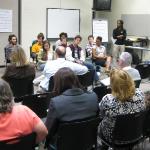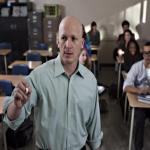In 2010, violent crimes against gay, lesbian and transgendered people were up 13 percent over the previous year. Murders increased by 23 percent, according to the National Coalition of Anti-Violence Projects.
The problem can start as early as elementary school, but teachers who witness sexual bias in the classroom are often unsure of how, or whether, to intervene.
To heIp them figure it out, a non-profit group in Los Angeles uses live theater to train teachers to counteract homophobia in schools.
The Teacher training program begins with a staged scene. High school actors, playing high school students, walk into their English class talking about a teen who was beaten up the day before.

Lori Nelson/Encompass
A student actor shares his character's reactions with participants. Skyler Jackson (R-standing) leads the Creating Bias-Free Classrooms teacher training."If Travis wanted gay rights, he got them," says one actor. "Rights, lefts, uppercuts, a kick to the face. Bam!"
The discussion heats up, and the kids start baiting each other. Before long, the class is out of control.
This training program is presented by Encompass, a non-profit group that focuses on diversity issues in California schools. The actors are students from the LA County High School for the Arts. School administrators, counselors and teachers are in the audience.
According to the Gay, Lesbian and Straight Education Network, challenging moments like the one in the skit, come up a lot. By the time they get to high school, 90 percent of lesbian, gay, bisexual, or transgendered students have experienced physical, verbal or sexual harassment at school.
Artistic Director Kevin Blake, who co-wrote the scene and plays Mr. McGregor, the teacher in the scene, says that can poison the classroom environment for everyone.

Braden Summers/Encompass
Kevin Blake as the teacher, Mr. McGregor"Just on that basic level, if these students are feeling this pressure or this bullying or teasing or harassment, they're not able to focus on their work, they're not able to accomplish what they're there in school to accomplish."
And when that happens, Skyler Jackson, program director of Encompass says, California teachers don't have a choice about whether or not to intervene.
In 2000, state lawmakers amended the education code "...to include sexual orientation and gender identity and those that are perceived to be different based on sexual orientation to be protected from bullying and harassment in schools."
Twelve other states currently have similar laws. And a federal bill, which would require every school in the country to offer those protections, has been gaining support in congress.
An important aspect of the Encompass approach is that it's not about changing a teacher's attitudes or personal beliefs about homosexuality. Instead, the training offers tools to help teachers recognize and address sexual bias in their class.
After watching the first scene, teachers in the audience offer suggestions on how to better handle the situation. The actors then restage the scene, incorporating those suggestions.
There are other diversity training programs, but Encompass is different. Instead of getting a list of do's and don'ts, teachers get the chance to examine their own preconceptions, trade experiences, and then watch their ideas played out in the classroom.
"What really made a difference was the improv," says Beverly Tate, who teaches at Pasadena City College, "the way they came back the second time and really stayed true to their characters and to see the changes in the way the teacher addressed the bias and the language in the classroom."
Student actor Drew Cameron hopes they're making a difference. "Hopefully teachers are watching this and not just thinking, 'Here's some students that are putting on a scene for us.' [They're thinking], 'Here are some students who are showing us how to be better teachers.'"
Better teachers in a school where every student feels safe to focus on the job of learning.
